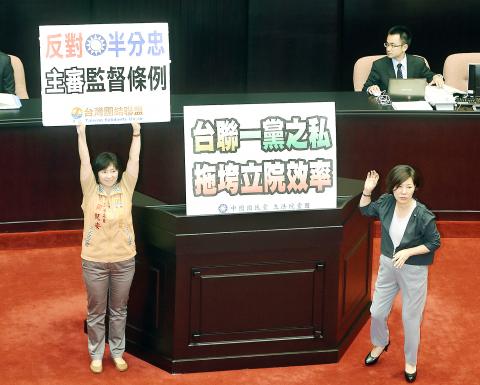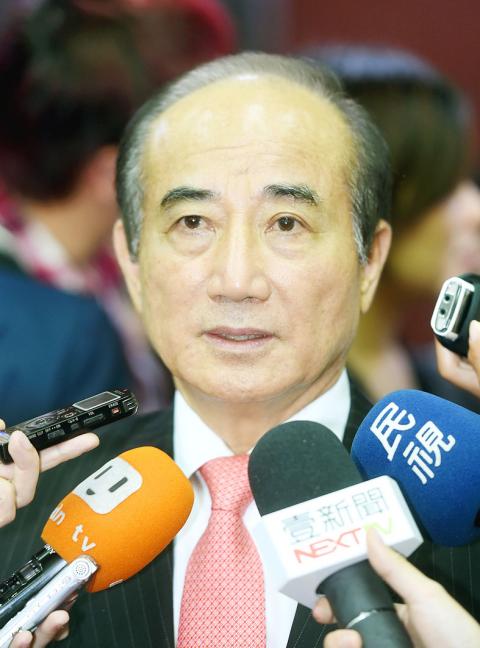Legislative Speaker Wang Jin-pyng (王金平) yesterday said that nothing would be “nonnegotiable” between Taiwan and China once certain conditions are met.
Wang made the remarks at a news conference about a Taiwanese film company’s documentary on a father-son pair of Qing Dynasty artist-officials, Dong Bangda (董邦達) and Dong Gao (董誥).
Chinese culture is what connects the two sides of the Taiwan Strait, Wang said, calling for more cultural exchanges, creating more consensuses and increased collaboration.

Photo: Fang Pin-Chao Taipei Times
“When one day the political systems of the two sides are compatible, the GDP per capita comparable, the social and public values similar, and religious freedom guaranteed, the heart of the two sides of the Strait could be melded together and nothing would be nonnegotiable then,” the speaker said.
Meanwhile, asked if he would run in next year’s presidential election for the Chinese Nationalist Party (KMT) or instead run for legislative office in Changhua County as has been rumored, Wang called the rumor “nonsense,” but refused to give a definitive answer about the presidential race.
He said a conclusion “would surely be out before May 16,” the deadline for picking up a KMT presidential primary application.

Photo: Fang Pin-Chao, Taipei Times
In related news, the Taiwan Solidarity Union (TSU) caucus stalled the legislature with 200 agenda-changing motions in a bid to derail a KMT plan related to draft bills for an oversight mechanism for cross-strait agreements.
The KMT reportedly aims to pass a reconsideration motion of referring the bills to the Internal Administration Committee for review.
If the reconsideration had been put to a floor vote yesterday as the KMT caucus had planned, it likely would have been passed, given the KMT’s legislative majority.
The party could then have had the committee’s convener, KMT Legislator Chang Ching-chung (張慶忠), preside over the review of the oversight bills.
Chang helped trigger the Sunflower movement in March last year by ramming the cross-strait service trade agreement through the committee and to the legislative floor in just 30 seconds.
The TSU launched its stalling campaign after cross-party negotiations broke down in the morning.
KMT deputy caucus whip Liao Kuo-tung (廖國棟) said the KMT conceded by allowing KMT Legislator Chiu Wen-yen (邱文彥) to chair the review instead of Chang.
However, TSU lawmakers said there should be a review without the KMT playing a presiding role in the committee.
They then proposed 200 motions to change the legislative agenda.
Each motion requires at least a few minutes to be put to a floor vote. When the floor meeting adjourned at about 4pm, only 61 of the motions had been voted upon.

PREPAREDNESS: Given the difficulty of importing ammunition during wartime, the Ministry of National Defense said it would prioritize ‘coproduction’ partnerships A newly formed unit of the Marine Corps tasked with land-based security operations has recently replaced its aging, domestically produced rifles with more advanced, US-made M4A1 rifles, a source said yesterday. The unnamed source familiar with the matter said the First Security Battalion of the Marine Corps’ Air Defense and Base Guard Group has replaced its older T65K2 rifles, which have been in service since the late 1980s, with the newly received M4A1s. The source did not say exactly when the upgrade took place or how many M4A1s were issued to the battalion. The confirmation came after Chinese-language media reported

A Ministry of Foreign Affairs official yesterday said that a delegation that visited China for an APEC meeting did not receive any kind of treatment that downgraded Taiwan’s sovereignty. Department of International Organizations Director-General Jonathan Sun (孫儉元) said that he and a group of ministry officials visited Shenzhen, China, to attend the APEC Informal Senior Officials’ Meeting last month. The trip went “smoothly and safely” for all Taiwanese delegates, as the Chinese side arranged the trip in accordance with long-standing practices, Sun said at the ministry’s weekly briefing. The Taiwanese group did not encounter any political suppression, he said. Sun made the remarks when

The Taiwanese passport ranked 33rd in a global listing of passports by convenience this month, rising three places from last month’s ranking, but matching its position in January last year. The Henley Passport Index, an international ranking of passports by the number of designations its holder can travel to without a visa, showed that the Taiwan passport enables holders to travel to 139 countries and territories without a visa. Singapore’s passport was ranked the most powerful with visa-free access to 192 destinations out of 227, according to the index published on Tuesday by UK-based migration investment consultancy firm Henley and Partners. Japan’s and

BROAD AGREEMENT: The two are nearing a trade deal to reduce Taiwan’s tariff to 15% and a commitment for TSMC to build five more fabs, a ‘New York Times’ report said Taiwan and the US have reached a broad consensus on a trade deal, the Executive Yuan’s Office of Trade Negotiations said yesterday, after a report said that Washington is set to reduce Taiwan’s tariff rate to 15 percent. The New York Times on Monday reported that the two nations are nearing a trade deal to reduce Taiwan’s tariff rate to 15 percent and commit Taiwan Semiconductor Manufacturing Co (TSMC, 台積電) to building at least five more facilities in the US. “The agreement, which has been under negotiation for months, is being legally scrubbed and could be announced this month,” the paper said,